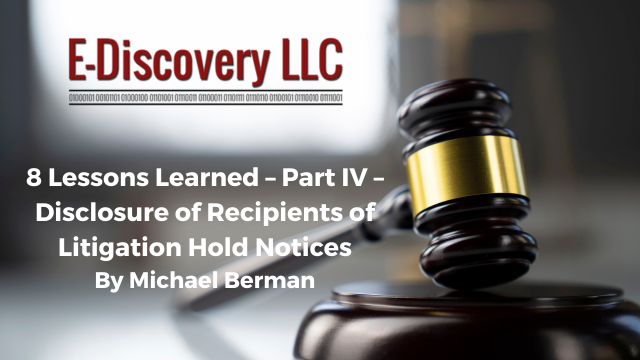
[EDRM Editor’s Note: The opinions and positions are those of Michael Berman.]
This is the fourth and final follow up to 4 Things You Never Wanted to Hear + 8 Lessons & a Dispute Over Revealing Recipients of Litigation Hold Notices, All in One Case (May 4, 2024), discussing In Re: Social Media Adolescent Addiction/Personal Injury Products Liability Litigation, 2024 WL 1808607 (N.D. Cal. Apr. 25, 2024).
The Social Media Addiction court resolved a dispute over disclosure of the names and job titles of litigation hold notice recipients and the date the notice was received. The court explained:
The … Plaintiffs argue that they need this information in some disclosed form in order to be able to compile a complete and accurate list of Defendants’ document custodians…. Defendants argue that information regarding their litigation holds is work product protected from discovery and improper “discovery on discovery.”
In Re: Social Media Adolescent Addiction/Personal Injury Products Liability Litigation, 2024 WL 1808607, at *2 (N.D. Cal. Apr. 25, 2024).
The Social Media Addiction court held that the basic identifying information was not privileged. It rejected defendants’ argument that this discovery was only permitted when document preservation issues are in dispute. The court wrote:
If, as Defendants concede, litigation hold recipients’ basic identifying information is not privileged in the context of a preservation dispute, then there is no legal basis for holding such information privileged in the context of other disputes. Either a document is work product protected from discovery, or it is not….
This basic information is exactly the same information which would appear on a privilege log for withheld work product, if the Court were to require the Parties to provide privilege logs of documents which post-date the Complaint in this matter….
Further the list of persons who received litigation holds is not, itself, work product because disclosing that list does not disclose any of the analyses, bases, or criteria used by counsel to create that list. Rule 26(a)(1)(A)(i) requires counsel to provide a list of individuals likely to have discoverable information that the party may use to support its claims and defenses, and that list is not considered work product even though it directly implicates the party’s claims and defenses.
In Re: Social Media Adolescent Addiction/Personal Injury Products Liability Litigation, 2024 WL 1808607 (N.D. Cal. Apr. 25, 2024).
Importantly, the Social Media Addiction request at issue did not include disclosure of the contents of a litigation hold notice sent from an attorney to the attorney’s client. There, a prima facie preservation or spoliation dispute should be a necessary predicate to require production and disclosure of some attorney-client communications implementing a litigation hold.
Further the list of persons who received litigation holds is not, itself, work product because disclosing that list does not disclose any of the analyses, bases, or criteria used by counsel to create that list.
In Re: Social Media Adolescent Addiction/Personal Injury Products Liability Litigation, 2024 WL 1808607 (N.D. Cal. Apr. 25, 2024).
For a discussion of when some attorney-client implementation communications become discoverable, see The Honorable Paul W. Grimm, Michael D. Berman, et al., “Discovery About Discovery: Does the Attorney-Client Privilege Protect All Attorney-Client Communications Relating to the Preservation of Potentially Relevant Information?,” 37 U. Balt. L. Rev. 413, 455 (2008)(“Certain facts–such as what steps a litigant took, or failed to take, to preserve material–should be deemed routinely discoverable. Other facts, such as the contents of a litigation hold letter, and attorney-client implementation discussions, should require a greater showing to support disclosure.”); Am. Soc’y for the Prevention of Cruelty to Animals v. Ringling Bros. & Barnum & Bailey Circus, 2008 WL 11388433, at *2 (D.D.C. Aug. 5, 2008)(citing law review article); Spoliation—Litigation Holds—Discoverability of Hold Notices, 32 No. 5 Fed. Litigator NL 11(May 2017)(citing law review article); Are Litigation Hold Notices Discoverable? (Mar. 5, 2022); When is a Litigation Hold Notice Discoverable? — When a Litigation Hold is Defective (Aug. 9, 2021); When is a Litigation Hold Notice Discoverable? (Dec. 1, 2020); and, Discovery on Discovery (Apr. 29, 2022).


